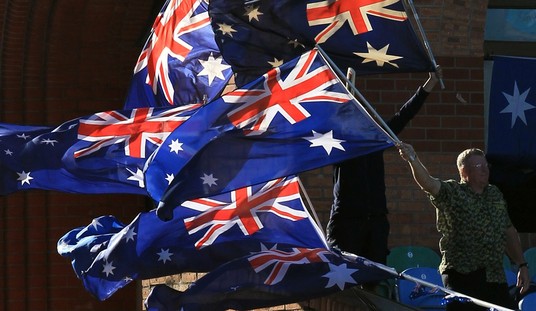Yes, as always, we ask the important questions ’round here.
Dean Martin has appeared twice in recent weeks on James Lileks’ Bleat, and both occurrences represent the dueling nadirs of postwar pop culture. Back in late November, Lileks featured stills from Dean Martin’s craptacular Celebrity Roasts from the mid-1970s. As I wrote back in my link, this was the last redoubt of my parents’ idols, after the New Left conquered Hollywood at the end of the previous decade.
But the handwriting was already on the wall, even before the left had won the war.
This week, Lileks featured stills from Deano’s 1968 hour-long Christmas “Special,” and on the previous day, wrote a great set-up to how the swank postwar Rat Pack era had sunk to such a cavernous depth:
It’s quite the artifact – an intersection of the waning culture and the new Hip, Vibrant, With-It culture that was seeping into everything. It’s mesmerizing and horrible. 1968 may have been the worst year between WW2 and 2001. Judging from this short 48-minute account of attitudes, styles, musical selections, design, clothing, and general tone, you might think that the culture was utterly exhausted, so incapable of doing anything but beaming treacle into the slack faces of middle-aged men and women pasted to their La-Z-Boys, huddling indoor against the winter wind and the shrieks of the dying society, that there was no way back.
We survived. Things got better.
Well, at least for a time. (True story: I read Lileks’ post featuring Deano’s Christmas Special on my Android tablet on the treadmill at the gym while listening to Peter Gabriel’s Security album on headphones. I almost fell off the machine the moment I was struck by the cognitive dissonance of those two never-the-Fairlight-shall-meet cultures colliding inside my cranium.)
Sociologists are still sifting through the evidence of how the collapse of postwar pop culture occurred after the death of JFK, but here’s one possible timeline that explains Dean’s central role. In 1964, Dean presented the nascent Rolling Stones to an American culture that was still digesting what it thought about the well-scrubbed, suit and tie wearing Beatles. The Stones, spurred on by manager Andrew Loog Oldham, were at the height of their anti-Beatle phase, inspiring such lines as “Would you let your daughter marry a Rolling Stone?” and “The Beatles just wanted to hold your hand — the Rolling Stones wanted to rape and pillage your town.”
But the music industry quickly went all-in supporting the Beatles, Stones and similar groups. Shortly after the Beatles’ American debut, as Mark Steyn has written, Dean’s contemporary Nat “King” Cole saw the handwriting on the wall — or more precisely heard it; not through the grapevine, but through his telephone receiver. He “called up his record company, whose coffers he had enriched for many years, and hung up in disgust when the receptionist answered: ‘Capitol Records, home of the Beatles.'”
Clearly, Martin saw the future as well — and was not happy:
The haunting fear of what was to come lies all over Dean’s 1968 Christmas Special. The fulcrum that ties that show with his mid-seventies Roasts was 1970’s Airport, in which Deano played the pilot of the film’s Boeing 707, which was nearly blown out of the air by an angry bomber. Which means that Dean also inspired the seventies’ run of disaster films, featuring Earthquakes, Towering Infernos, sinking Poseidons, and an omnipresent Shelly Winters. These films would be fueled by (and would add fire to) the notion that America was in serious decline during that awful decade of Vietnam, Watergate, the Arab Oil Embargo, Iranian Hostage Crisis and polyester.
All of which forces us to reach our conclusion about Martin, and contemplating it is not an easy statement to make about a beloved cultural icon. But considering the amount of damage the man unwittingly inflicted upon the culture, isn’t obvious that the real Manchurian Candidate wasn’t Laurence Harvey, but the enemy agent who spent years infiltrating the Rat Pack, and eventually passing himself off as Sinatra’s closet friend, before wreaking havoc on an unsuspecting nation?
Too much, you might ask? Well, consider this: I haven’t even mentioned Jerry Lewis until now.









Join the conversation as a VIP Member